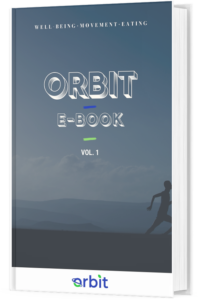Challenging the food police means that you say ‘No’ to the voice in your head who makes you feel guilty when you eat foods you enjoy, or who judges you for your food choices.
Intuitive Eating5 is a book, created by Evelyn Tribole and Elyse Resch, that presents 10 principles to create a healthy relationship with your food, body, and mind. The 10 principles build upon one another. Work on every principle one by one, following the correct order. If you have not read the Principle #1, or # 2, or #3 please refer to them before getting into this article.
Food, Guilt, Worry, and Anxiety1,2,3,4
Since when has food become so focused around guilt, worry, and anxiety?
The experience of food pleasure, rooted in French, or Indian culture has diminished due to people worrying about food. People on restrictive diets, or chronic dieters experience high levels of guilt after eating a food they consider to be “bad”, or “fattening”. Additionally, not only chronic dieters experience guilt related eating. Non-dieters and dieters guilt levels increased based on how “fattening” they consider the food to be.
The feeling of guilt is supposed to arise after committing an illegal, or immoral act. Somehow, this feeling seems to surround us within our eating experience. Anybody experiencing food-driven guilt is getting the same feeling they would get from cheating on an exam, or stealing from a shop, as they would from eating food they enjoy.
Feelings of guilt have negative effects on the self-concept, as they it has been associated with poor self-esteem, loss of control, negative self-evaluation, self-aggression, and self-criticism.
Commercializing of “Guilty” or “Guiltless” Foods
- Guilt free foods in grocery stores:
Popcorn brand name: “Guilt-Free Goodness: Skinny Pop”
Banana brand name: “Guilt-Free Snacking: Banana Chiquita”
Yogurt brand name: “Reduce Guilt: Spinach and Kale Greek Yogurt”
- Guilt free articles, and tricks:
“Guilt-Free Snacks that Fill You Up and Help You Lose Weight”- CheatSheet.com
“Your Essential Guide to Guilt-Free Snacking”-Forbes
The urge to eat without guilt is EVERYWHERE. The irony is that this “guiltless” industry has increased guilt levels higher than ever.
Food Talk5
Our inner voice, the voice of society, and the voice of friends and family around us can play a role in the guilt trip around food.
We have all experienced the comment, or judgmental stare from a friend or family member as we went for a second serving of dinner. Every stare, and every comment makes our inner Food Police stronger and louder.
Every time a new rule is set in relation to the way we eat, the Food Police strengthens. As a result, the Food Police voice strengthens and the more guilt we experience when breaking the rules. When the “rules are broken”, the more likely it is to overeat.
Here are a few common rules, presented in numerous fad diets:
- No eating after 7 pm.
- Foods with added sugar are “bad” for you.
- I should not eat fat.
- Bread and pasta are “fattening”.
Despite research demonstrating the way in which these claims can have detrimental effects on eating habits and health, it is extremely hard to let go of rules if you have lived by them for several years.
The Various Food Voices5
Elyse Resch and Evelyn Tribole (2012) have adapted Dr. Berne’s ego state model to a model identifying the different voices that make up the “dieting voice” and the “intuitive eater voice”.
Dieting Voices
The dieting voices are compromised of the Food Police, the Diet Rebel, and the Nutrition Informant.
1. The Food Police:
The Food police causes guilt and judges your eating habits. It makes food choices based on the guiltiness of a food label and does not honor your inner hunger and fullness cues.
When you eat very little calories, the Food Police will exclaim that you had a good day. If you eat a ‘bad’ food, the Food Police with fill you with guilt and unloving messages towards your body and mind. Self-criticism can have extremely negative effects on your self-concept.
Despite not being a chronic dieter, the Food Police will often re-emerge.
2. The Nutrition Informant
The Nutrition Informant will try to keep you on track of eating healthy foods in line with your food rules. This voice will use food labels to pressure you into eating, or not eating something. The Nutrition Informant feeds health information to the Food Police. This means that if The Nutrition Informant chooses to only eat fruit and vegetables the whole day, yet feel hungry, the Food Police will ‘praise your efforts’, and ‘good behavior’
3. The Diet Rebel:
The Diet Rebel voice wants you to fight against the Food Police and anybody judging your eating. That voice wants you to break all your rules. The Diet Rebel says:
- “I want to gain weight”
- or, “I don’t care about gaining weight”
- I want to eat 10 cookies because my brother just gave me wicked stare when I ate one.
When the Diet Rebel voice comes out, you might find yourself overeating, past your fullness cues, and feel physically unwell.
These 3 voices are often self-destructive and lead to a vicious cycle of guilt, judgement, and overeating.
Intuitive Eater Voices
The Intuitive Eater abolishes the:
The Food Police
The Intuitive Eater turns the:
Nutrition Informantinto the Nutrition Ally.Diet Rebelinto the Rebel Ally
The Intuitive Eater also has the voice of a:
- The Food Anthropologist
- The Nurturer
1. The Nutrition Ally
Once you have said “No!” to the Food Police, the Nutritional Informant voice becomes the Nutritional Ally voice. The Nutritional Ally can help you make healthy food choice, without following any type of rule. For example, if you have high blood pressure, the Nutrition Ally might suggest choosing the crackers with a lower sodium content.
2. The Rebel Ally
You can the ability to twist your Diet Rebel voice into the Rebel Ally! When you hear your inner Food Police voice come, scream a loud ‘NO!’. Do not accept that voice anymore. The Rebel Ally can also help you with judgement friends, or family members that make comments about your eating habits.
“Use your words instead of food”
(Resch & Tribole, 2012, p.102)
- What to say to a grandmother insisting on you finishing the pasta bowl:
“Grandma, I am satisfied. I would really appreciate if you stopped insisting on me finishing it. I would love to take it home for lunch though!”
- What to say to friends and family commenting on your weight (losing weight or gaining weight):
“We have much more interesting topics than my weight to catch on. How was your vacation?”
Or, “I’d rather not talk about my weight.”
- What to say when a friend says that you really earned the desert today, as you had a big workout:
“That actually triggers me, as I don’t like to consider the food I eat as something I earned from my exercise. I exercise because it feels good and I eat because I love food and am hungry.”
- What to say to when your mother talks about being bad for eating the whole bag of popcorn with you:
“Did we steal the bag of popcorn? That would be bad.”
Or : “What would have been bad was if I didn’t eat the popcorn when that was exactly what I felt like eating.”
3. The Food Anthropologist
The Food Anthropologist is a voice that observes your eating, without judgement. For example, this voice acknowledges your hunger and fullness signals, and notes what you eat:
- I ate a big breakfast and was hungry 3 hours later.
- or, “I had 3 scoops of ice cream.”
- I was not focused on my meals today.
A good way to shine light to this voice is to keep a journal with non-judgement statements about your eating behavior. For example, you can note what hunger sensations you felt, or what emotional reaction you had after eating dinner.
The Food Anthropologist allows you to continuously observe your inner signals, and your psychological reactions to the foods you eat without criticism. This voice can be perceived as a “mindful observer of your eating experience.”
- The Nurturer
The Nurturer voice is the contrary of the Food Police voice. It soothes you with self-compassionate messages and tells you that what you eat does not define your self-concept. The Nurturer is supportive of your efforts, and helps you cope with the destructive messages arising from the unpleasant inner voices, and outer voices.
The Evolution of Food Talk
Think about what type of household you grew up in?
- Were your family members were always talking about their weight?
- Was eating an enjoyable experience?
- Thing about conversations related to weight
- Did you feel judged for what you ate?
- If you grew up in a household in which food and body judgement was NOT an issue:
Think about how, and when you discovered the dieting voices? (Weight loss ads, conversations with friends, classes, TV?)
Were you able to keep your intuitive voices from the household in which you grew up?
- If you grew up in a household in which food and body judgement WAS an issue:
Did you ever experience the intuitive eater voices? When? How did it make you feel?
Notice which voices are present in your mind, and the ways they can be replaced by kind, loving voices arising from Intuitive Eating. Refer to the ways you can change your negative self-talk with regards to your eating habits.





